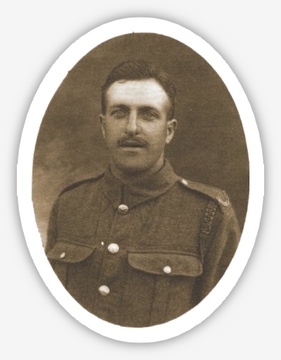Frank Riseley
Home » Frank Riseley
Frank Riseley |
||
|
Frank was the son of William Riseley, blacksmith, and his wife Annie. Frank was born on 4 January 1895. There were two girls, May and Kate, and three boys, Kay, Frank and Henry in the family. Frank enlisted in the 1st Battalion, Cambridgeshire Regiment, ‘A’ Company, at St Neots in January 1916. His younger brother, Henry, enlisted in the 9th Suffolks in March 1916 and Kay, the oldest son, was called up into the Royal Engineers in March 1917. Frank’s uncle was Martin Riseley (brother to William), another Eltisley man who gave his life in World War One. Frank enlisted on the same day as Alick Childerley and Sidney George Hayden. The three had known each other all their lives. Frank and Sidney George had been born in Eltisley, on the same day, and Alick three months later. Frank lived in a cottage on one corner of the Green, and Sidney George and Alick lived along two sides of the Green. From the timing of their enlistment, it appears that the three were volunteers under the Derby Scheme, before conscription was introduced. The battalion was in the trenches at Authuille at the beginning of October 1916 and participated in attacks on the Schwaben Redoubt; Thiepval had just been secured by the allies, but attempts continued to capture the Schwaben Redoubt from the Germans. On 10 October the battalion was in reserve in the Leipzig Redoubt. On 14 they moved up to take up positions in the assembly trenches, for the attack on the Schwaben Redoubt, which took place on 16 October. The battalion suffered 25 Officers and Other Ranks killed, 164 wounded, and 4 missing in the attack. On 1 November the battalion suffered 5 more casualties when they were in dug-outs at Thiepval. Between 8 and 10 November the battalion was back at the Schwaben Redoubt, trying to hold onto it. Casualties during 48 hours in this subsection Other Ranks killed 2, wounded 33, about the average these days. Both Frank and his friend Alick Childerley were among those wounded in one of these attacks in October, as, on 17 November 1916, the local newspaper, the St Neots Advertiser, reported that Private Frank Riseley had been wounded and was in hospital in England, and that his friend Private Alick Childerley had also been wounded and was in hospital in France. Frank and Alick had been together since they enlisted. Frank’s wounds were severe; he was not returned to fighting duty until four months later. On 23 March 1917 the St Neots Advertiser reported that Frank had been discharged from hospital and had been home on leave for ten days, returning to his regiment at Brighton earlier that week. Alick was not to return to the front; his injuries (shrapnel wounds to his head) were such that he was discharged from the Army in February 1917. Frank was killed on 26 September 1917, during what is known as The Third Battle of Ypres, which had started on 31 July. The 1st Cambridgeshires were involved in the front line and in reserve from 31 July, so, if it is correct that Frank was missing after his first action on return from sick leave, he did not arrive back with his battalion until September, when they were preparing for the attack near Shrewsbury Forest, just outside Ypres. |

Frank Riseley
|
|
| Frank has no known grave; he is commemorated on the Tyne Cot Memorial to the missing at Zonnebeke, near Ypres. The Tyne Cot Memorial bears the names of almost 35,000 officers and men whose graves are not known. | ||
